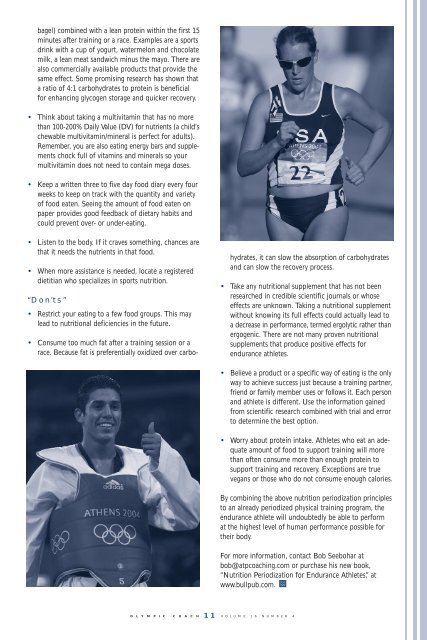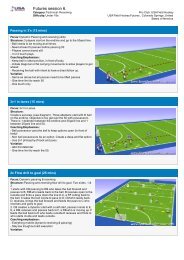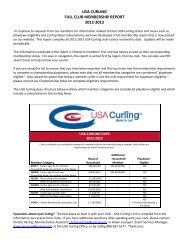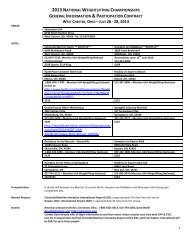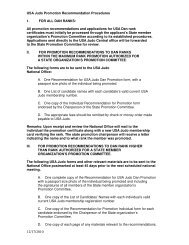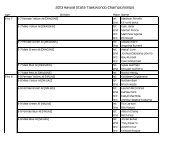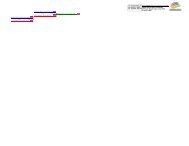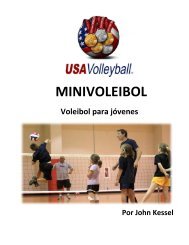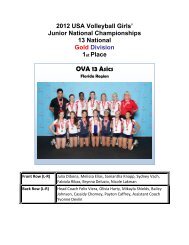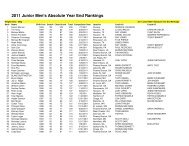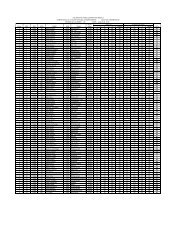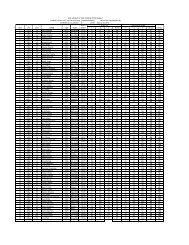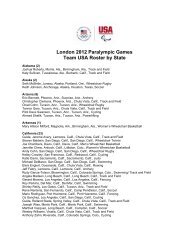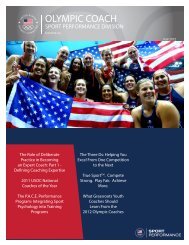OLYMPIC COACH - United States Olympic Committee
OLYMPIC COACH - United States Olympic Committee
OLYMPIC COACH - United States Olympic Committee
You also want an ePaper? Increase the reach of your titles
YUMPU automatically turns print PDFs into web optimized ePapers that Google loves.
agel) combined with a lean protein within the first 15<br />
minutes after training or a race. Examples are a sports<br />
drink with a cup of yogurt, watermelon and chocolate<br />
milk, a lean meat sandwich minus the mayo. There are<br />
also commercially available products that provide the<br />
same effect. Some promising research has shown that<br />
a ratio of 4:1 carbohydrates to protein is beneficial<br />
for enhancing glycogen storage and quicker recovery.<br />
• Think about taking a multivitamin that has no more<br />
than 100-200% Daily Value (DV) for nutrients (a child’s<br />
chewable multivitamin/mineral is perfect for adults).<br />
Remember, you are also eating energy bars and supplements<br />
chock full of vitamins and minerals so your<br />
multivitamin does not need to contain mega doses.<br />
• Keep a written three to five day food diary every four<br />
weeks to keep on track with the quantity and variety<br />
of food eaten. Seeing the amount of food eaten on<br />
paper provides good feedback of dietary habits and<br />
could prevent over- or under-eating.<br />
• Listen to the body. If it craves something, chances are<br />
that it needs the nutrients in that food.<br />
• When more assistance is needed, locate a registered<br />
dietitian who specializes in sports nutrition.<br />
“Don’ts”<br />
• Restrict your eating to a few food groups. This may<br />
lead to nutritional deficiencies in the future.<br />
• Consume too much fat after a training session or a<br />
race. Because fat is preferentially oxidized over carbo-<br />
11<br />
O L Y M P I C C O A C H VOLUME 16 NUMBER 4<br />
hydrates, it can slow the absorption of carbohydrates<br />
and can slow the recovery process.<br />
• Take any nutritional supplement that has not been<br />
researched in credible scientific journals or whose<br />
effects are unknown. Taking a nutritional supplement<br />
without knowing its full effects could actually lead to<br />
a decrease in performance, termed ergolytic rather than<br />
ergogenic. There are not many proven nutritional<br />
supplements that produce positive effects for<br />
endurance athletes.<br />
• Believe a product or a specific way of eating is the only<br />
way to achieve success just because a training partner,<br />
friend or family member uses or follows it. Each person<br />
and athlete is different. Use the information gained<br />
from scientific research combined with trial and error<br />
to determine the best option.<br />
• Worry about protein intake. Athletes who eat an adequate<br />
amount of food to support training will more<br />
than often consume more than enough protein to<br />
support training and recovery. Exceptions are true<br />
vegans or those who do not consume enough calories.<br />
By combining the above nutrition periodization principles<br />
to an already periodized physical training program, the<br />
endurance athlete will undoubtedly be able to perform<br />
at the highest level of human performance possible for<br />
their body.<br />
For more information, contact Bob Seebohar at<br />
bob@atpcoaching.com or purchase his new book,<br />
“Nutrition Periodization for Endurance Athletes,” at<br />
www.bullpub.com.


